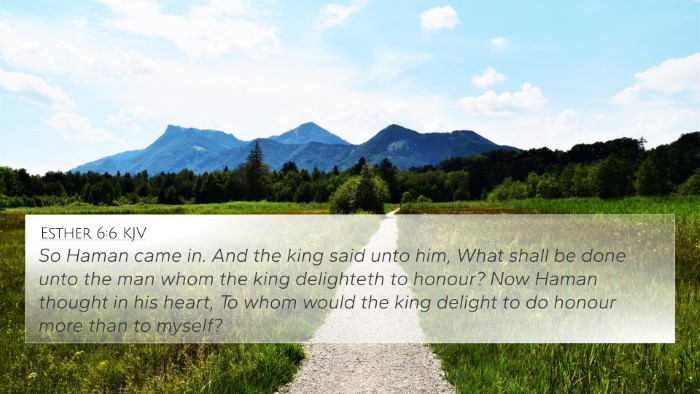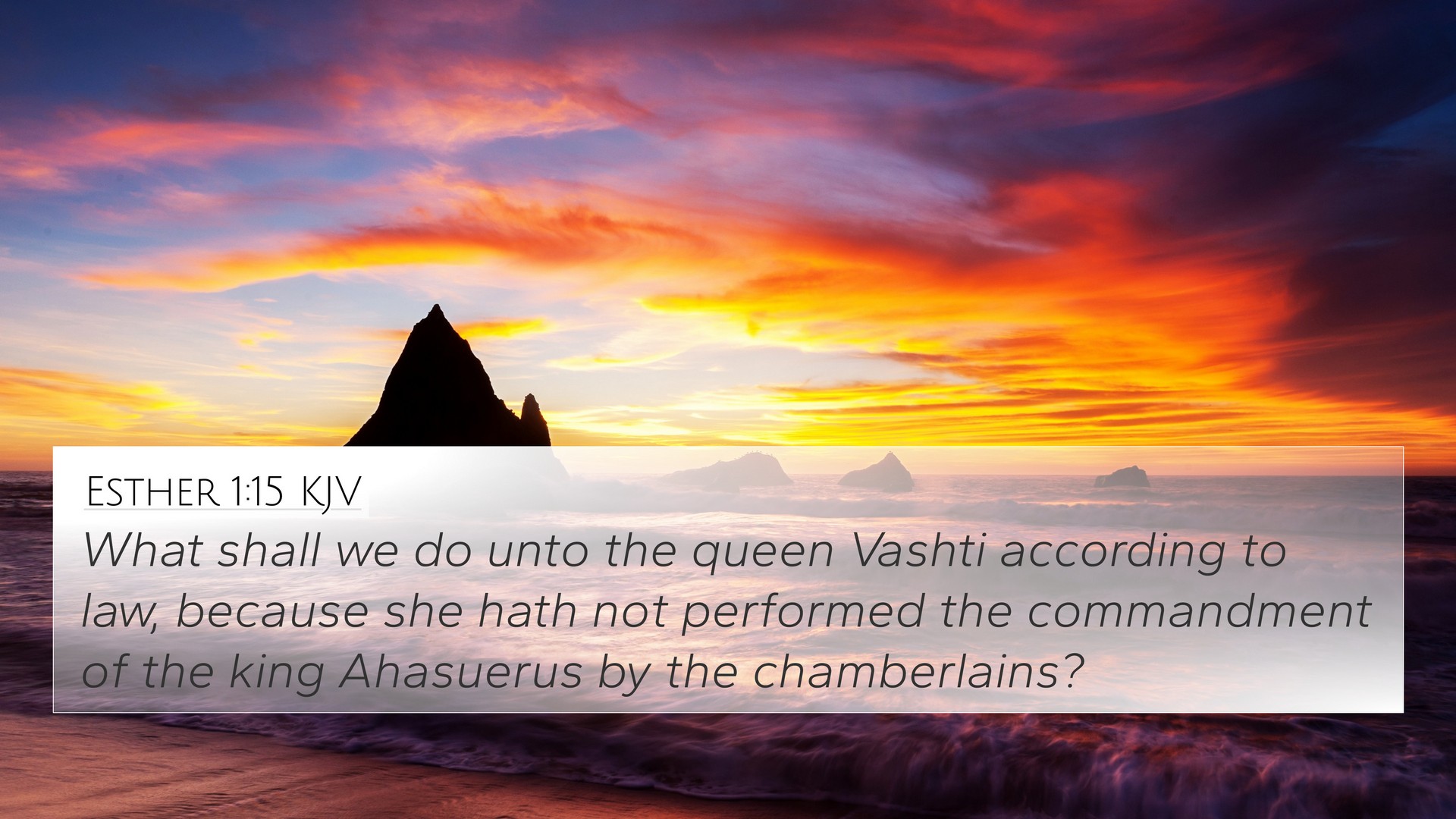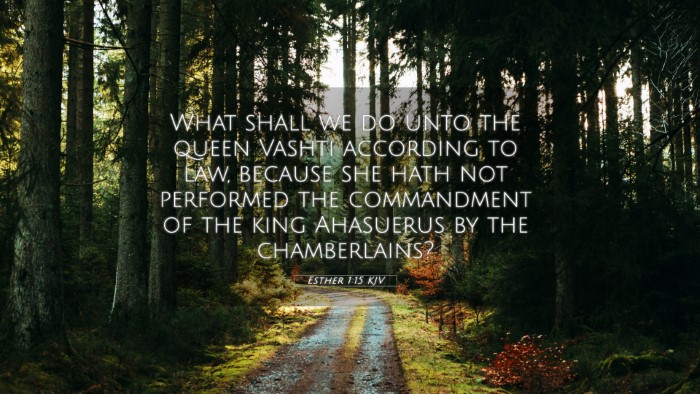Old Testament
Genesis Exodus Leviticus Numbers Deuteronomy Joshua Judges Ruth 1 Samuel 2 Samuel 1 Kings 2 Kings 1 Chronicles 2 Chronicles Ezra Nehemiah Esther Job Psalms Proverbs Ecclesiastes Song of Solomon Isaiah Jeremiah Lamentations Ezekiel Daniel Hosea Joel Amos Obadiah Jonah Micah Nahum Habakkuk Zephaniah Haggai Zechariah MalachiEsther 1:15 Similar Verses
Esther 1:15 Cross References
What shall we do unto the queen Vashti according to law, because she hath not performed the commandment of the king Ahasuerus by the chamberlains?
Uncover the Rich Themes and Topics of This Bible Verse
Listed below are the Bible themes associated with Esther 1:15. We invite you to explore each theme to gain deeper insights into the Scriptures.
Esther 1:15 Cross Reference Verses
This section features a detailed cross-reference designed to enrich your understanding of the Scriptures. Below, you will find carefully selected verses that echo the themes and teachings related to Esther 1:15 KJV. Click on any image to explore detailed analyses of related Bible verses and uncover deeper theological insights.

Esther 6:6 (KJV) »
So Haman came in. And the king said unto him, What shall be done unto the man whom the king delighteth to honour? Now Haman thought in his heart, To whom would the king delight to do honour more than to myself?
Esther 1:15 Verse Analysis and Similar Verses
Understanding Esther 1:15
Esther 1:15 states: "What shall we do unto the queen Vashti according to law, because she hath not performed the commandment of the king Ahasuerus?" This verse occurs in a pivotal moment in the narrative of Esther, where King Ahasuerus, after a grand feast, seeks to summon Vashti, his queen, to display her beauty before his guests. Her refusal initiates a series of events that set the stage for the unfolding drama of the book.
The question posed by the king highlights several layers of meaning that various commentaries have explored.
Commentary Insights
Matthew Henry's Commentary
Matthew Henry emphasizes the implications of Vashti's disobedience to the king's command. He suggests that her refusal may stem from a desire to uphold her dignity and integrity in defiance of the king’s wishes, which could be seen as degrading. Henry notes that this sets a significant precedent for the power dynamics between men and women, particularly in a royal context. He presents Vashti's act not merely as rebellion but as an assertion of her self-respect.
Albert Barnes' Notes
Albert Barnes provides an analysis of the cultural implications of the situation. He notes that the king's inquiry reflects the importance of law and authority in Persian society. Barnes elaborates on the consequences of Vashti's actions, pointing out that her defiance challenges the king's authority and public perception. He views the king's question as a crucial moment that necessitates a reaction consistent with the laws of the land, potentially leading to severe repercussions for Vashti.
Adam Clarke's Commentary
Adam Clarke interprets this verse as a turning point in Vashti’s character development. He emphasizes that her refusal draws attention to her agency and serves as a pivotal moment for the eventual rise of Esther. Clarke argues that the incident illustrates the conflict between personal morals and societal expectations, and how one woman’s stand can have far-reaching consequences in the narrative of salvation history.
Key Themes and Insights
- Authority and Disobedience: The verse sets the stage for exploring themes of authority, rebellion, and the consequences of disobedience.
- Gender Dynamics: Vashti's act can be viewed as a challenge to gender roles, inviting discussions about the position of women in ancient cultures.
- Cultural Context: The inquiry reflects the legalistic nature of Persian kingship and the expectations placed upon royal figures.
- Divine Providence: As the story unfolds, the refusal also foreshadows God's intervention in the affairs of His people, leading to Esther's rise as queen and Jewish deliverance.
Related Bible Verses
Esther 1:15 can be cross-referenced with several other scripture passages that deepen our understanding of its context:
- Proverbs 21:1 - "The king's heart is in the hand of the LORD, as the rivers of water: he turneth it whithersoever he will." This shows God's control even over kings.
- Genesis 3:16 - Discusses the dynamics of authority and submission between husbands and wives.
- 1 Samuel 8:7 - Insights into leadership and the limitations of human authority versus divine ordination.
- Esther 4:14 - Highlights the significance of Esther's rise to power as a divine plan for the Jewish people.
- Romans 13:1 - Pertains to the obligation of obedience to governing authorities.
- Acts 5:29 - “We ought to obey God rather than men.” A discussion of the priority of divine command over human authority.
- Matthew 10:28 - Speaks of the fear of God over the fear of human authority, relevant in the context of Vashti’s courage.
Thematic Connections
The exploration of Esther 1:15 and its related scriptures shows the interconnectedness of biblical themes such as authority, obedience, and the life-altering implications of individual choices. The stories compel readers to engage with ethical considerations in the context of faith and leadership, reminiscent of dictums found throughout both Testaments.
Conclusion
Esther 1:15 serves as a crucial entry point into the larger narrative of Esther and highlights enduring themes relevant today. Understanding the dynamics at play can aid in comprehending broader scriptural truths and applying them meaningfully in contemporary life. For those interested in scriptural cross-referencing, exploring how this verse relates to others can enhance one’s study and appreciation of biblical texts.


